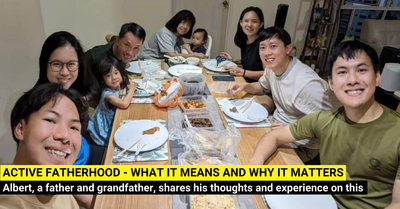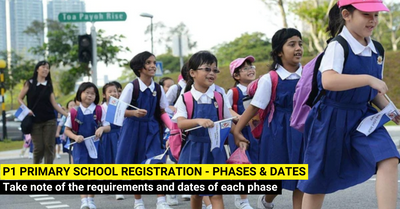This week, we speak with Ms Yvon Bock on her personal experience and tips on how to raise children with your in-laws.

Having stayed with her in-laws for 10 years, Ms Yvon Bock, Member of Focal Area Support for Young Couples under the Alliance for Action to Strengthen Marriages and Family Relationships and, Founder and Managing Director of Hegen Pte Ltd, shares her experience and tips for those following her footsteps.
1. How did you and your spouse manage child rearing with your parents and in-laws? What is the arrangement like in the family?

I moved in to stay with my in-laws after having my first child and I stayed with them for 10 years. Prior to moving in, I had conversations with Leon (my husband) and talked about what life would be like. We come from different family upbringing, so naturally, values will differ. We talked about balancing challenging circumstances and differing opinions, setting boundaries, and creating guidelines about space and privacy with my in-laws. Another thing we both agreed on was to respect each another’s values, not to confront but aim to resolve peacefully.
Advice on raising children often changes from one generation to the next, so there will be differences in ideas between in-laws and modern-day parents. For us, our arrangement with my parents and in-laws is that Leon and I will discipline. Often the grandparents tend to step in to rescue or help, but we set the boundaries that we are the parents, and we will be the ones that will discipline. We were committed to give clear and consistent communication with my in-laws when it comes to certain dos and don’ts with regards to children. I believe that by demonstrating positive examples of respectful communication and compromise with a parent or parent-in-law will help children find their own approach to problem solving and manage emotions.
2. What are the common challenges faced by parents who are raising their child with their in-laws?
One of the common challenges is boundaries. While parents adjust to the challenges of parenting, to have a grandparent who doesn’t respect boundaries can add additional stress to the parents. Another common challenge is the feeling of being judged in terms of parenting styles. Child-rearing advice often changes from one generation to the next. Each generation has its own parenting beliefs, and parenting advice has changed over the years. Conflicts tend to rise when grandparents insist that their seniority in the family means their parenting style is effective.
3. What are some ways conflict be reduced between the parents and grandparents when raising a child together?
My in-laws and my family come from two different schools of thought. My in-laws value independence and enjoy individual activities. On the other hand, my parents raised me in an environment that believes strongly in togetherness and family life and upbringing. For example, I emphasise a lot on having dinners together as a family with everyone present at the table, whereas my in-laws did not practice that, and it was ok for everyone to eat at their own preferred time. How did I tackle that? I had a conversation with my husband, and shared with him my thoughts on the importance of having dinner together as a family.
We agreed as a couple to instil this practice in our family with our kids, but we did not insist that my in-laws must join us. Together, we had a chat with my in- being exposed to the arts, different cultures and learnings. Naturally when I started living with my in-laws, I was not used to the different approach towardslaws and shared with them our plan and intentions. We allowed them to continue to be themselves, but we informed them that this is our preference and they are welcome to join in this practice whenever they’d like to.
Similarly, when it came to raising my kids, I believed in allowing my kids to grow in an environment where they are allowed to explore different cultures and interests. While my in-laws are more conservative and traditional in choices, I encourage and support my children to try different things. Leon and I had a conversation with my in-laws and let them know that while we respect their opinions, we hope they will also respect our preference and not make it challenging for our children to have a curious mind and eventually they can decide for themselves what they’d like to pursue.
I believe living together with in-laws is not about taking conflicts head on or forcing anyone to change to suit and fit your own practices or beliefs. It is important that as a couple to discuss and agree on a decision before informing the in-laws. Together, take a non-confrontational approach, have a sit down to chat and inform each other about the preferences.
You may visit Families for Life for more tips on communicating and building a good relationship with your in-laws.
4. In your opinion, what are some of the benefits of a multigenerational home?
I understand there are trade-offs living in a multigenerational home, but there are many benefits too. One of the main benefits is that our children can interact with their grandparents on a daily basis and they have the opportunity to build memories together. Grandparents have been through an era that the new generation will not totally comprehend. While the children and extended family members living together can help provide physical, mental, and emotional care and support to grandparents, the elderly can at the same time contribute to the family not just in helping with caregiving tasks, but also in demonstrating and passing on family values, dialects, heritage and culture through sharing of stories. In Singapore’s context for example, grandparents can share about how kampung life was like, the hardships they have gone through, and why racial harmony is so important for Singaporeans.
Being in a multigenerational home also means that as a couple, we could carve out more quality time together with each other while our children are in the care of their grandparents.
As a member of AFAM’s FA2: Support for newlyweds, I encourage newlyweds and soon-to-weds to consider attending MSF’s Marriage Preparation Programmes (MPrep) to better prepare themselves with communication skills to live together. MPrep is a great way for couples to discuss all the most important decisions, values and expectations which you need to agree on before you get married. Most young couples will have discussed some important aspects of their future marriage, but they may not have thought through all the key issues to be addressed. MPrep allows you to benefit from the experiences of other married couples, family counsellors and coaches. It allows you and your partner to gain greater insights, re-affirm and prepare yourselves for your marriage.
You can find out more about MPrep through here.
5. What significance do grandparents play in the upbringing of a child?
As we currently live in a technology-driven world that is much faster and progressive than the previous generation, families have evolved. In many cases, both parents are working and may not be able to spend as much time with their children when compared to the older times. Grandparents help make
up for the quality family time that children crave for when parents are busy. They also provide a sense of belonging to children, keep them close to the family roots and family traditions. Roots & heritage are very important and if we can find a good balance and set healthy boundaries, multi-generational living is beneficial in family bonding and building strong family identity.
More about Alliance for Action to Strengthen Marriages and Family Relationships
In August 2021, The Ministry of Social and Family Development (MSF) had launched the Alliance for Action to Strengthen Marriages and Family Relationships, which brings together stakeholders, community partners and Singaporeans together to co-create solutions and implement them to strengthen marriages and families. Through these efforts, we hope to inspire and support parents in their parenting journey. In order to cope with key transitions and better support their children’s development, parents can access various parenting resources such as just-in-time tips and topics as well as bite-sized parenting information.
Parenting Support Providers (PSPs) also offer Triple P seminars for Grandparents. The Positive Parenting Programme (Triple P) Seminars for Grandparents help grandparents understand roles, expectations and how to manage differences with their adult children. Grandparents will learn how to confidently handle their grandchild’s behaviour using evidence-based strategies and take pleasure in the joys of being a grandparent while building strong, healthy relationships with their family.
In search of activities for your kids this coming June school holiday? You can look forward to having lots of fun family time during the week-long National Family Week (3-11 June), where you can enjoy an exciting line-up of events and promotions to bring families together. This includes family carnivals with fun-filled activities such as life-sized Becky Bunny bouncy castle and performances across heartland locations all over Singapore!








